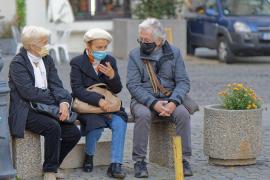Covid-19 infection of a near relative increases psychological burden in elderly
The Covid-19 pandemic and the associated social measures have had a negative impact on the well-being of the population. Studies have shown increased anxiety, depression and stress during the pandemic among the older population, in particular those who had experienced Covid-19 infection in the social circle. Own infection experiences have also been shown to negatively affect mental health. However, questions on the impact of social proximity in combination with infection severity on psychological burden were previously left unanswered.

Theresa Heidinger, BSc MSc, from the Division of Gerontology and Health Research and Dr. Lukas Richter BSc MSc of the University of Applied Sciences St. Pölten investigated the reported increase of psychological burden due to own COVID-19 infection or infection of relatives as well as acquaintances in person of 50 years and above. Data from the 2021 Corona Survey of the "Survey of Health, Aging and Retirement in Europe (SHARE)" project was used for the analysis which included more than 40,000 participants from 28 different European countries. Severity of infection experience (no infection/ positive test/ hospitalization or death) and social proximity to the infected party (self/close social circle/ distant social circle) were crossed to evaluate their effect on psychological burden increase (higher anxiety and or depression, trouble sleeping as compared to 2020). Additionally, variables describing the unpredictability of everyday life during the pandemic titled “loss of control” encompassing postponement and cancellation of medical appointments and reliance on help from others as well as “subjective health status” and socio-demographic factors were included into the analysis.
Own severe COVID-19 infection experience as well as severe infection in the social circle increases psychological burden, whereby even less severe experiences lead to a higher risk of increased psychological burden in the pandemic. The study provides evidence of the negative impact of own as well as other infection experience on the mental health of older persons. Loss of control or a perceived deterioration in health status increase psychological burden in their own right.
The study highlights the importance of quickly gaining control over the pandemic, as long-term negative effects on the mental health of older people must be expected due to the superimposing effects of the influencing factors shown here.The publication is freely available to everyone within the framework of the KL's open access agreement with the publisher Frontiers.




